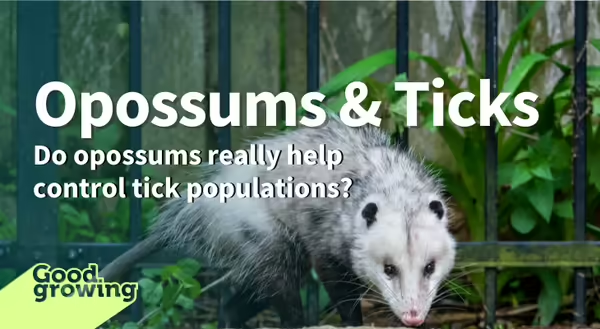
It seems like every social media exchange where the topic of ticks or opossums comes up, I see a meme or photo glorifying the opossum and saying they will keep ticks out of your yard. This statement is based on a 2009 study that showed opossum grooming led to them devouring ticks from their bodies. I’m not an opossum expert. I study plants. I’ll let the wildlife biologists make the call on this one. If they say opossums eat lots of ticks, then opossums must eat lots of ticks.
However, in addition to opossum memes (which can be quite hilarious), I am also seeing people purposefully attracting these marsupials to their yards to help with tick control. However, leaving food and shelter for opossums also draws in other creatures such as raccoons, feral cats, rats, mice, and other rodents. Many people online are also encouraging others to attract opossums to their yards. According to the 2009 study opossums are good at controlling ticks, right?
Last week an interesting research paper landed in my email inbox. It was a 2021 study published in the journal Ticks and Tick-borne Diseases titled Are Virginia opossums really ecological traps for ticks? Groundtruthing laboratory observations. (Cool fact: this study was done right here in Central Illinois from Eureka College.) Turns out we may have been a bit hasty on this whole “possums eat 5,500 ticks per week” idea.
Do opossums eat ticks?
Let’s break down some of the 2021 study, starting first with what the literature says about opossums eating ticks:
- The authors of the 2021 study looked at 23 other published papers that examined the diets, some including scat or gut contents of Virginia opossums. None found evidence of tick nymphs or adults being eaten by opossums.
- All studies showed a preference for insects and other invertebrates in the opossum’s diet. However, there is variation based on seasonality and rural vs. urban environments.
Critique of the 2009 study
The authors of the 2021 study also closely examined the 2009 study:
- The 2009 study captured five Virginia opossums (a very small sample size) and placed 100 larval ticks on each in a confined laboratory setting. And then counted how many ticks fell off after every 24 hours. Opossums were released back into the wild after 96 hours (4 days) from being inoculated with the larval ticks.
- It is assumed that 4 days would be enough time to hold the animals captive as that would encompass the average feeding time a tick would need to take a full blood meal and then drop off the animal.
- How long does it take for a tick to feed on an opossum? Considering a variety of opossum and tick species numbers average from 3 to 9 days.
- One issue identified is holding the captive opossums in an air-conditioned lab may have slowed the ticks' metabolism. Additionally, opossums have a low metabolism and body temperature, further lengthening the time it would take a tick to take a full blood meal.
- On average 3.5 ticks fell off the five captive opossums. The remainder were assumed to have been eaten during the opossums' grooming. The opossums were not checked for ticks before being released back into the wild. That’s kind of a big deal!
Data from the 2021 study shows no ticks ingested by opossums
The 2021 study authors also described their research on the gut contents of 32 opossum carcasses collected from Central Illinois. Ticks were found on the carcasses, but no tick parts were found in the gut contents of the animals.
Bottomline: Do opossums eat thousands of ticks a week?
Maybe we all jumped on the opossum/tick bandwagon too quickly. It seems opossums aren’t as voracious eaters of ticks as we thought. And attracting them to your yard may not be the trick for keeping tick numbers down. Opossums are still fascinating creatures and our only marsupial in Illinois. So, keep up the opossum love, avoid leaving out food that could attract other rodents, and always check for ticks.
Good Growing Fact of the Week: Virginia opossums are ineffective at transmitting rabies, but they are carriers of several tick-borne diseases including babesiosis, ehrlichiosis, Rocky Mountain Spotted Fever, and Lyme disease.
Read the research articles
Cecilia Hennessy & Kaitlyn Hild, (2021). Are Virginia opossums really ecological traps for ticks? Groundtruthing Laboratory Observations. Ticks and Tick-borne Diseases. https://www.sciencedirect.com/science/article/abs/pii/S1877959X21001333
Keesing, F., Brunner, J., Duerr, S., Killilea, M., LoGiudice, K., Schmidt, K., Vuong, H., & Ostfeld, R. S. (2009). Hosts as ecological traps for the vector of lyme disease. Proceedings of the Royal Society B: Biological Sciences, 276(1675), 3911–3919. https://doi.org/10.1098/rspb.2009.1159
Sign up for our emails! Want to get notified when new Good Growing posts are available? SIGN ME UP
Give us feedback! How helpful was this information (click one): Very helpful | Somewhat helpful | Not very helpful
MEET THE AUTHOR
Chris Enroth is a horticulture educator with University of Illinois Extension, serving Henderson, McDonough, Knox, and Warren counties since 2012. Chris provides horticulture programming with an emphasis on the home gardener, landscape maintenance personnel, and commercial landscapers. Additional responsibilities include coordinating local county Master Gardener and Master Naturalist volunteers - providing their training, continuing education, advanced training, seasonal events, and organizing community outreach programs for horticulture and conservation assistance/education. In his spare time, Chris enjoys the outdoors, lounging in the garden among the flowers (weeds to most).